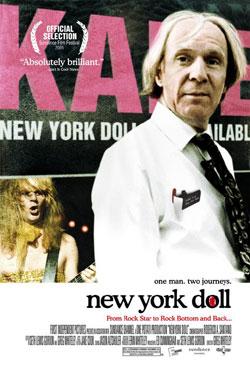 I’ve always been fascinated by Pete Best. What must it be like to be fired from The Beatles just before they become worldwide sensations? How do you deal with living life in Liverpool while the other three guys you used to hang out with go on to conquer the culture of the entire planet?
I’ve always been fascinated by Pete Best. What must it be like to be fired from The Beatles just before they become worldwide sensations? How do you deal with living life in Liverpool while the other three guys you used to hang out with go on to conquer the culture of the entire planet?
That’s the story of Arthur “Killer” Kane, to a very lesser degree. He was one of the founding members of The New York Dolls, a great proto-punk band that was much more influential than they were actually heard. Of course it seems like every single person who ever did hear them formed one of the major bands of the next few decades, including The Clash, Blondie and The Smiths. The Dolls were a truly great group, but they burned out very early, and Kane, who had been the lumbering bassist, found himself adrift.
He spent a few years trying to make it in music, and then he became a complete disaster of a drunk. When he happened to catch former bandmate David Johanssen (probably better known as Buster Pointdexter – what a fascinating change that guy made) on TV, Kane had a complete breakdown, jumped out his third floor window and survived. He soon found religion, in the form of Mormonism, which helped him clean up. It’s a big chasm between the semi-cross dressing of the Dolls and the crisp white shirts of the Mormons.
New York Doll picks Kane up in 2004. He’s living in Los Angeles and taking the bus to his job at the Mormon genealogical library. He’s sort of sweetly dimwitted, and he’s barely able to make ends meet. His past still haunts him, but he’s making an honest go at his present, where he hangs out with old librarians who couldn’t tell a New York Dolls record from the sounds of construction.
Then there’s a New York Dolls reunion, happening that summer in England. Kane has to get his bass out of hock, practice up – and scariest of all, get back together with the bandmates he hasn’t seen in thirty years.
New York Doll is strongest in the earlier scenes, when it’s telling the story of the band and Kane’s life. Once the band gets back together things are a little anti-climactic. We’re told that they were great, but who really cares? The drama was about how this profoundly addled man was going to deal with things, and once he dealt with them, you feel you could move on. But the film is wisely aware that the story doesn’t end with the triumphant concert like it does in a movie – Kane has to go back to riding the bus to the library after revisiting being a rockstar for a weekend. And that’s where things get…
Well, let’s put it this way. The alchemy of a documentary is in the fact that the filmmakers really don’t know what’s going to happen next. I won’t spoil what happens on Kane’s return home (although some rock fans may be aware), but it recasts everything that came before in a different light. It’s really one of the top shock endings of 2005, and it’s a documentary. Who would have imagined?
The story of Killer Kane is really a cautionary one for all people involved in the arts. Sure, he was in a band that changed rock music forever, but that doesn’t mean he ended up being able to pay his rent thirty years later. It’s sad that the people who have the most impact on our lives are sometimes the ones without any sort of safety net at all.
New York Doll is a bittersweet little film. It’s sort of a bookend to this week’s other release, The Weather Man, in that it examines that unique disappointment that comes when our lives don’t meet our oversized expectations. Kane is funny and also sad; there’s something bathetic about him. The movie is funny and sad as well, in that way that aging rock stars are always funny and sad – there’s something endlessly Spinal Tap-ian about every bit of a band like the Dolls getting back together, these old guys putting on outfits meant to echo their younger, sexy selves.
Maybe that’s part of what I like about Kane. He’s found religion, so he doesn’t seem as much like a guy trying to recapture his youth as bandmate Sylvain Sylvain does. It’s how blues guys get to age with their music, how they find a dignity to continue. Kane, befuddled as he often seems, has that dignity to. This film honors that.